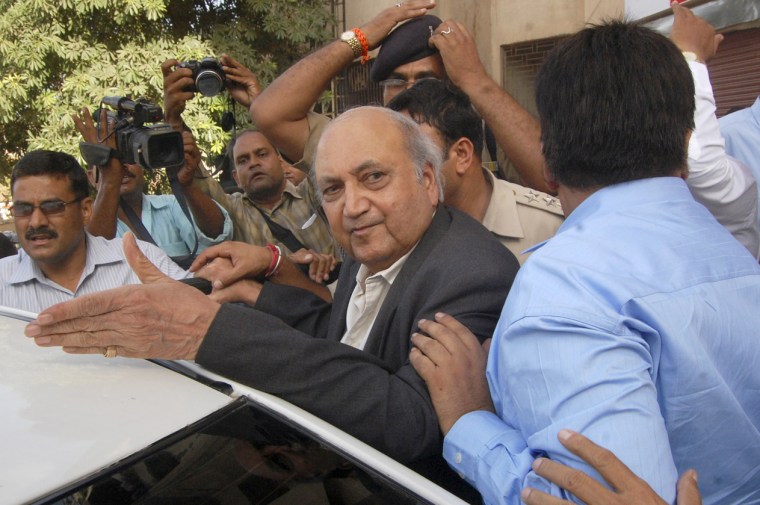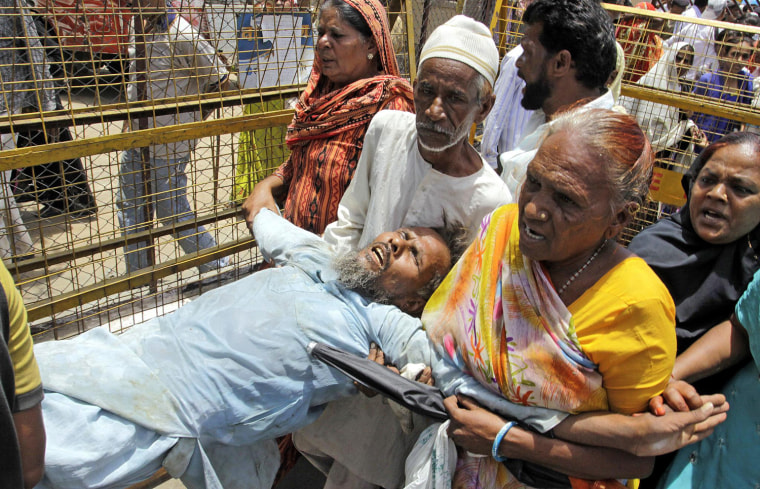A court Monday convicted seven former senior employees of Union Carbide's Indian subsidiary of "death by negligence" for their roles in the 1984 leak of toxic gas that killed an estimated 15,000 people in the world's worst industrial disaster.
Survivors of the Bhopal accident, some of whom gathered in this central Indian city chanting slogans, said the light sentences — two years in prison — are too little, too late given the scale of the damage. In India's notoriously slow justice system, the appeal process could drag on for years, even decades, while those convicted remain free on bail.
On the morning of Dec. 3, 1984, a pesticide plant run by Union Carbide leaked about 40 tons of deadly methyl isocyanate gas into the air of Bhopal, quickly killing about 4,000 people. Lingering effects of the poison raised the death toll to about 15,000 over the next few years, according to government estimates.
In all, at least 500,000 people were affected, the Indian government says. More than 25 years later, activists say thousands of children are born with brain damage, missing palates and twisted limbs because of their parents' exposure to the gas or water contaminated by it.
The Union Carbide subsidiary's former employees, all Indian nationals and many in their 70s, were sentenced to two years in prison and ordered to pay fines of 100,000 rupees ($2,175) apiece. All were released on bail shortly after the verdict.
The rulings appear set for appeals — the bail requests would be a first step in the appeal process — putting the case back into a notoriously slow and ineffective judicial system.
India's court system is badly burdened by corruption, incompetence and a lack of resources, making it easy to stall a case for many years. On Monday, even top Indian judicial officials acknowledged the system was in trouble.
"It's most unfortunate that it has taken that much of time to give the verdict," Law Minister Veerappa Moily told reporters after the ruling. "We need to address that."
'Travesty,' activist says
Rachna Dhingra, a longtime activist with the Bhopal Group for Information and Action, a rights group that works with survivors, blasted Monday's ruling as "a travesty of justice."
"But this is not new or unexpected," Dhingra said. "Every one of these men is free on bail and will go home to their families tonight. For survivors and families of victims there is nothing to go home to. They lost their families."
The subsidiary, Union Carbide India Ltd., was convicted of the same charge as the individuals and ordered to pay a fine of rupees 500,000 ($10,870). Union Carbide eventually sold its shares in the subsidiary company, which was renamed Eveready Industries India.
While the judge did not explain his negligence ruling against the seven, India's Central Bureau of Investigation, the country's top investigative agency, has said the plant was not following proper safety procedures before the disaster.
On Monday, Union Carbide in a statement on its website said the company and its officials were not subject to the jurisdiction of the Indian court since they did not have any involvement in the operation of the plant, which was owned and operated by UCIL.
Union Carbide was bought by Dow Chemical Co. in 2001. Dow says the legal case was resolved in 1989 when Union Carbide settled with the Indian government for $470 million, and that all responsibility for the factory now rests with the government of the state of Madhya Pradesh, which now owns the site.
Initially 12 defendants
The Central Bureau of Investigation had originally accused 12 defendants: eight senior Indian company officials; Warren Anderson, the head of Union Carbide Corp. at the time of the gas leak; the company itself and two subsidiary companies.
The 12 had initially been charged with culpable homicide, but in 1996 India's Supreme Court reduced the charges to death by negligence, which carries a sentence of two years in prison.

Seven of the eight Indian company officials were convicted Monday. The other one has since died. Anderson and Union Carbide did not appear in the court proceedings.
Anderson was briefly detained immediately after the disaster, but he quickly left the country and now lives in New York.
Last July, the same court in Bhopal had issued a warrant for Anderson's arrest and also ordered the Indian government to press Washington for the American's extradition. It was not immediately clear if the Indian government had begun to process the Bhopal court's request.
Investigators say the accident occurred when water entered a sealed tank containing the highly reactive gas, causing pressure in the tank to rise too high.
Union Carbide Corp. said the accident was an act of sabotage by a disgruntled employee who was never identified. It has denied the disaster was the result of lax safety standards or faulty plant design, as claimed by some activists.
